
Celebrating a decade of their label Cuttin’ Headz, The Martinez Brothers have reached a landmark moment in their career. With a summer residency at Hï Ibiza, and nonstop club and festival shows around the world, they’re in higher demand than they’ve ever been, and are showing no signs of slowing. Amy Fielding speaks to them about their musical roots, the allure of Ibiza, the evolution of their label, and their love of collaboration
The intangible pull of the New York electronic music scene, in its heyday as well as the present, is something that most music fans want to experience at least once in their lives. Gritty, underground and storied, eccentric and larger than life, it’s a timeless melting pot of house, disco, hip-hop and more, all at their biggest and boldest.
It was in the city, SoHo specifically, in the early 2000s that NYC natives Chris and Stevie Martinez had their first brushes with nightclubs while aged just 13 and 15. At legendary venues like The Shelter, they saw who they wanted to be and heard the music they wanted to play. In those spaces, their journey as DJs, producers, promoters and label heads, better known as The Martinez Brothers, truly began.
2024 was a landmark year for the Bros, celebrating 10 years of their record label Cuttin’ Headz with a riotous event at London’s Drumsheds, performing at festivals like Romania’s Sunwaves, Kappa FuturFestival in Turin, and Chicago’s ARC, and making stops in clubs from Italy to Colombia. They rounded off another summer residency at Hï Ibiza — the world’s No.1 club — while also making stops on the island for Jamie Jones’s Paradise at Amnesia, and their beloved Circoloco party at DC-10.
Despite their international lifestyle, when DJ Mag catches up with the Bros at the tail end of 2024, they’ve just returned to New York for some downtime, settling into a new apartment. Born and bred in The Bronx, their love for the city runs deep, and being able to return after one of the busiest years in their career is something they’re equal parts grateful and excited for.

“Everything was copacetic,” Stevie Martinez tells DJ Mag via video call. He’s sat with Chris, and the pair look comfy and relaxed, reflecting on the year as Christmas closes in. “It’s a nice end to the year, coming back together but in a new place, it’s kind of like a new start. Winter time is the time we take for ourselves.”
The brothers are rarely apart, and it’s been that way since long before those first days on NYC’s dancefloors. Some people with siblings probably couldn’t imagine living, working and travelling together, but for the Bros it’s one of the most important aspects of what they do — as is family in general. Not even five minutes into our conversation, Chris answers a call from their father, who, as they will go on to explain, has been pivotal in every stage of their career — from instilling a love of music, to taking them to those very first underground clubs.
A regular at Paradise Garage and a lover of all music, Steve Martinez Sr. was a pastor when the Bros were growing up. The fusion of those interests meant a heavy involvement with the church band. “People think Christian music, it’s only like gospel or whatever,” Stevie says, “but it’s Christian-all-types-of-music. Christian salsa, rap, we were listening to a lot of funky Christian music.
“For us, in our family, we were kinda like the rebels in church,” he continues, while Chris nods in agreement. “In church, you’re not supposed to listen to secular music. We were always listening to secular music.”
At home, Steve Sr. was also introducing his young sons to jazz. and the magic of artists like Herbie Hancock, as well as more modern funk acts like Jamiroquai. “That’s just some artists that our dad put us on to,” Chris says. “We were listening to hip-hop, but he would just come home and say, ‘You should really check these guys out’, and we’d be like, ‘Oh, snap! Where is he finding this stuff?’” Steve interjects: “And then when Napster came out — it was a wrap.” Chris grins, adding, “Oh no.”
Peer-to-peer file sharing network Napster, which launched in 1999, changed everything for the Bros and their exposure to music from their father. “I’ll never forget my dad’s face when we told him about Napster,” Chris says, laughing and putting his head in his hands. “He was like, ‘No way can you just download it’, and we had to tell him ‘Yeah, it could take three days, but we’d have it at some point’.”
Soon, the Bros were hearing tracks for the first time that their father hadn’t heard outside of spaces like The Loft and Paradise Garage in decades. It was a solid milestone in their journey to become established musicians, and in their relationship with Steve Sr.. “Our dad was a real pillar,” Stevie nods. With Steve Sr. shaping the Bros into lovers and appreciators of all types of music, experiencing the magic of mixing house music for themselves became an interest. Using very early mixing software on the PC, the Bros began to experiment with blending the records they’d been listening to. “I always knew that I wanted to be a DJ,” Stevie says. “Even before all the clubs. Seeing it on TV, people messing about with turntables and stuff. We were both just so curious about it.”
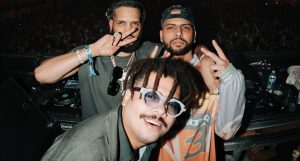
“When people tell us — God bless them — that they wanna release on Cuttin’ Headz… I dunno. When you hear something like that, it’s just like, ‘Damn, really?’ That’s the rewarding part.” – Stevie Martinez
Soon after, their father bought them their first ever physical kit — a Numark CD player with a mixer costing $300 — before they got onto a set of Denon decks. Record shopping for cuts to play on the turntables became the Bros’ weekend hobby, digging in stores on the streets of NYC, living and breathing the music that they were so invested in. Though NYC club age restrictions are a standard 21-plus, Steve Sr. didn’t see an issue with bringing his young sons out with him; he knew they’d cause no trouble. “He’d say, ‘Look, they’re good kids, they’re not gonna drink’,” Stevie remembers. The duo had already been throwing lowkey parties with the help from Steve Sr., making a buzz on the scene despite their age.
Throughout the interview, Chris and Stevie both affirm that before partying, the music always came first. Flipping the usual club graduation timeline for most aspiring DJs on its head, the duo found themselves looking at house music and clubs from a different “vantage point”. These spaces were “soulful and underground”, and the people there saw themselves in the young duo — and took a liking to them. The brothers weren’t there to party, they wanted to learn.
It wasn’t until Chris and Stevie were in their late teens and twenties that they experienced club culture outside of New York, and outside of those spaces that had been crammed with people who Stevie describes as “real OGs”. They’d been throwing their own parties and playing at the clubs they’d first frequented with their father, and their love for the music and drive to explore the sound further pushed them outside the city and the States altogether, sending them to Ibiza, Berlin and London.
Attending parties like Sven Väth’s Cocoon, and seeing and meeting DJs like Argy, Luciano and Loco Dice, the pair experienced a completely different side to the underground they had known and loved. “Club culture is like a bunch of subsets,” Stevie says. “We came from such a traditional view of house, built on people like Louie Vega, Larry Levan, David Mancuso.”
Chris interjects, “And up until that point, we did only want to listen to that type of music, but we were visiting these new places, and at that time, stuff like minimal and techno was going crazy. “We started opening up this habit of just keeping our ears and our minds open,” Chris continues. “And man, there was so much stuff. So much stuff that we started bucking out to. That scene hadn’t really come to the States yet. Even people like Jeff Mills, they’re from the States, but they were playing overseas. I feel like in the US in the early 2000s, people kind of forgot about that other underground sound for a little while.”

One place that captured the Bros more than any other was Ibiza. After feeling like they had plateaued in their early career, playing the same clubs in the same cities, the White Isle was one of the places that called out to them. They were worried that they were being perceived as a gimmick because they were just “two young kids” often playing to empty rooms. Almost two decades on, there’s no empty rooms to be seen — especially in Ibiza. 2024 marked the Bros’ third consecutive year as Hï Ibiza residents, bringing guests like Apollonia, Black Coffee, Chris Stussy, Dennis Ferrer, Eliza Rose, Loco Dice, PAWSA, Seth Troxler and TSHA to the superclub.
But their journey started inside a club that every Ibiza head will tell you is crucial to the island’s DNA: red-walled electronic haven, DC-10, specifically the Circoloco parties, where they spent 10 years inside and outside the booth. Playing at DC-10 happened by chance. The Bros had originally travelled to Ibiza to play elsewhere, but when that fell through, the club’s talent booker Elliot Shaw invited the duo to fill a slot. “He just gave us a platform and an opportunity,” Stevie says. “We weren’t fulfilled anymore, we weren’t really playing in the places we wanted to play. We really capitalised on that opportunity to play DC-10, and took it seriously.”
Ibiza is, really, where all the building blocks were stacked for The Martinez Brothers. They’d built their foundations in NYC, but those early trips to the White Isle changed everything — especially their vision. Ibiza, they explain, is the first place they really felt music could be a career, not just a passion. “It was after a couple of years at DC-10, we realised we were in, and that we could do this for real for real,” Stevie says. “It was a place that really allowed us to express ourselves the way we really wanted to, and play anything we wanted to play.
“It was a dope crew at that time,” he continues, Chris nodding in agreement. “We were really getting on with people like Seth [Troxler], Apollonia, Jamie [Jones], going to after-parties, really living that Ibiza lifestyle. It really helped us grow, watching all those different DJs and being in the club all the time.” “We’d be in that club when we didn’t even have to play,” says Chris. “We’d go every single week just to hang out and see our friends. It was just a good place to connect with everybody and connect the dots. They’re just family. They have no idea, they pushed us when we didn’t even know if we would keep doing this.”
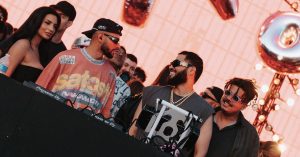
“We were really getting on with people like Seth [Troxler], Apollonia, Jamie [Jones], going to after- parties, really living that Ibiza lifestyle. It really helped us grow, watching all those different DJs and being in [DC-10] all the time.” – Chris Martinez
Now club culture has shifted, and the Bros reminisce fondly about the magic of the White Isle during that time in the early 2010s, and how those formative experiences, combined with those in New York, play a major factor in what they do today. “We were in that club for 10 years, no headline slots straight away,” Stevie says. “It doesn’t work like that today. We had to work our way up.” They share more fond memories: seeing their names slowly move from the bottom to the top of Circoloco flyers, growing up in an era without social media, enjoying the grind, and that original essence of Ibiza. “It was that little bit more rewarding,” Chris says. “We really worked for it.”
“I really, really miss that,” Stevie agrees, looking as though he’s only really just now absorbing how much has changed in the last decade. “And it’s not just in Ibiza. I hate to sound like that guy, like ‘back in my day’… but things just happen so fast now. 10 years isn’t even really that long ago, is it? It feels like yesterday to me.”
Those early sets in Ibiza from the Bros were part of what’s now considered to be Ibiza’s modern-day golden era, mirroring the underground energy that first drew dancers in. It’s also shaped their sound now, not just in their sets but their productions too, where they pair soulful and vocal moments with rolling tech-house beats, Latin influences and Balearic percussion.
The Martinez Brothers released their first EP, ‘My Rendition’, in 2006 via fellow New Yorker Dennis Ferrer’s Objektivity. A seven-minute trip through housey keys and club-primed stabs, complete with a stripped-back B-side, Chris reveals it was made entirely on a Roland Fantom. The duo had no studio equipment at this point, or even a studio to use, and it was around the same time that Chris had reached out to Ferrer on MySpace.
They soon started spending time with the veteran house head, who took them under his wing. “I always say he [Ferrer] was one of the ones that actually hit us back,” Stevie says. “We’d obviously hit DJs up here and there, and it was such a new thing being able to hit people up online. We came from the era of looking in the back of CD covers and vinyls trying to find out how to hit someone up. We just hit up our favourite DJs and producers, and he was excited.”
With Ferrer coaching them in the studio, the Bros were quickly learning how to use equipment and build tracks from their basic ideas. The pair also share that Ferrer actually built them their first computer, and gave them their first software. “We took the stems to Dennis, and he got it to a place that you hear now,” Chris says, “he showed us how to do it, with us in the driving seat. Telling us to do everything — you know, ‘Try this, try that’. He taught us by making us do the work.”
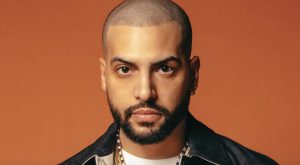
Solo follow-ups came in 2010 and 2011. Emboldened by Ferrer and their experiences in the studio, as well as gigs becoming more and more frequent, they dropped ‘Don’t No Yet’ and ‘The Causeway’ / ‘Issshhh!’. “When you’re first producing, you’re copying the people you love,” Stevie says. “‘My Rendition’ was like what Âme were doing at the time. They had that sound that was kinda almost techno. But that ‘Issshhh!’ EP, we were just tryna sound like Radio Slave. All his records were sounding so incredible.” “I feel like that’s how it usually goes,” Chris says. “You chase your favourite producers, and then it starts becoming your own thing. I feel like we never really had a sound, we were just doing what we were feeling in the moment.”
After a few years refining their practice, The Martinez Brothers were making more music than ever, and connecting with upcoming artists that they wanted to offer the same experience they’d had: a family unit that would raise each other up and share their music. By 2014, they decided the best way to do that was by launching their own record label, Cuttin’ Headz. It’s been home to some of their biggest hits, like 2016’s glitched-out tech anthem ‘Stuff In The Trunk’, featuring Miss Kittin, and sun-soaked house cut ‘Let It Go’ with Louie Vega and Marc E. Bassy.
The label has released over 50 records, kick-starting careers as well as supporting established names. AJ Christou, Fleur Shore and Jaden Thompson — now all regular faces on Cuttin’ Headz and the global tech-house scene — released some of their earliest music via the imprint, while artists like Art Department, Guti, the late Jackmaster, Loco Dice, Mochakk, K-Lone and INVT have also appeared across its discography.
“It just started as an innocent idea, really,” Stevie says. “It was a labour of love. We were just like, ‘Let’s do something fun, let’s put records out by our friends’.” He and Chris speak about the DIY edge to Cuttin’ Headz in its infancy, like how they created the EP artwork, drawing influence from street art and graffiti artists of the time — “Banksy was running amok,” Chris laughs.
“Everyone was making a label and we just thought, ‘Are we supposed to do this too?’” Stevie says, also laughing. “We were just kids at that point. We just wanted to do it all. It’s been a really fun journey. When people tell us — God bless them — that they wanna release on Cuttin’ Headz… I dunno. When you hear something like that, it’s just like, ‘Damn, really?’ That’s the rewarding part. “People don’t really know this about me and my brother, but we love to give and help anybody and everybody in any way we can. We’re those guys, know what I mean? That’s the reward.”
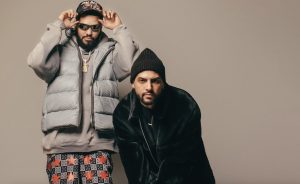
“Everyone was making a label and we just thought, ‘Are we supposed to do this too? We were just kids at that point. We just wanted to do it all.” – Stevie Martinez
Now in its 10th year, Cuttin’ Headz has evolved from a record label to an events series. Showcasing artists from their label, as well as friends from along the way, the most recent, sold-out celebration at Drumsheds saw them play B2B with fellow Circoloco regular PAWSA. “Everyone was having a grand old time,” Stevie says with a big grin, reflecting on the night briefly. “No matter where you went, it was a sweaty rave. It was hot, it was steamy, and everybody was just having it. It was a blessing, everybody showed out for it and supported it.”
“It was kind of overwhelming,” Chris adds. “We’re there with our buddies and we’re looking out at the crowd in disbelief that it’s been 10 years.” The Bros also co-run Tuskagee Records with Seth Troxler, which launched in 2014 with a collaborative EP from the pair, and now boasts an equally impressive roster of artists like Butch, HoneyLuv, Paul Johnson and William Djoko, putting an emphasis on platforming Hispanic and Black artists.
When speaking about production, the Bros confess that they don’t spend as much time making music as they’d like. Stevie shares that they find it hard to produce on their laptops when travelling or set up in hotels, preferring the immersive experience of a studio. “This past year has probably been the least time we’ve spent in the studio,” Stevie says. “There’s just been so much going on behind the scenes. We’re moving into a new apartment, packing up stuff. It was just a whole lot of movement. This winter, we’re really going to get back into it. We’re already working on some songs that are sounding really, really dope.”
The Bros explain that production and DJing are almost like two part-time jobs that they split throughout the year. “When we’re in DJ mode, especially when it’s a summer residency, every weekend we spend finding music. Digging is like its own job. There’s more music coming out than ever, and not only that, it’s quality music too,” Stevie says. “They’re just two different modes, and I like the idea that DJing and production are two completely separate parts.”
“I wish we were guys who could make music between shows, but we’re like heavy gear-heads and heavy on studio equipment,” says Chris. “We’re the kind of guys that need to touch things. Your connection with production is the same as your approach to DJing, when we make music we want to feel that rush.”
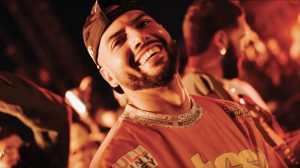
Collaboration has always been a huge part of the Bros’ production process, be it through remixes or on original tracks. Frequently teaming up with Cuttin’ Headz and Tuskagee label mates, and tapping up the likes of Dom Dolla, LSDXOXO, Mochakk and Vintage Culture to remix their own tracks, they’re constantly looking for new ways to explore their art. In 2022, they shared chunky tech- house cut ‘KILO’ with Dominican rapper Tokischa, while their 2023 track with vocalist Eliza Rose, ‘Pleasure Peak’, explored a more subdued, pop- influenced sound. Their most recent release, ‘Paris Fashion Week’ with Canadian rapper Tommy Genesis, is a Tchami-esque club anthem.
“It’s good to collaborate with people that don’t necessarily work in dance music,” Stevie says. “That’s where the magic happens, when worlds collide. We like to work with people who love music, who want to offer something unique and interesting.” “And we’re always looking for the next dope artists, big or small,” says Chris. “Just getting different ideas and coming up with something we’d never have thought of.”
With an extended period of time at home and in the studio on the horizon, it feels like the duo are right where they need to be. We ask them what it’s like to be so young and reflect on such a storied career. “I can’t speak for my brother,” says Stevie, “but I think the fact we’re still even involved in the conversation, and the fact we’re still relevant as artists, is something I’m proud of. We’ve seen people come and go; you wonder what happened to this person or that person. But the fact people are still interested and show up to our shows, telling us we inspire them, they wanna be on our label. Those little things make us super brave. Lasting two decades in anything isn’t easy.”
“And also, I know it’s not cheesy, but the fact we get to do this together,” adds Chris. “I couldn’t picture any other way of doing it,” Stevie agrees, gesturing to his brother. “There’s no way of doing it without my brother. Just being together through thick and thin, like all the behind the scenes stuff, we’ve been through a lot. There’s more to us than music, it’s just one small facet of our lives. But my blessing is to do this with him and be close to family. It’s unreal.
“This whole thing started ’cause of family,” he continues. “We bonded with our dad over music and we’re still doing this.”

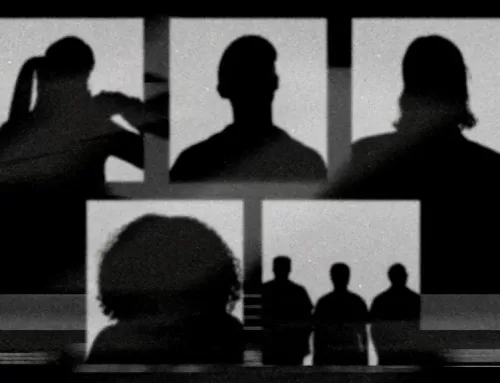

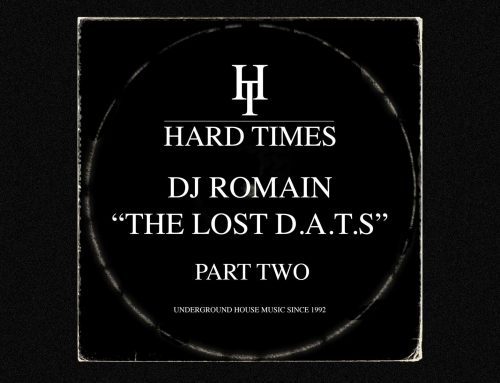

![Carl Cox says his Ibiza residency at [UNVRS] will be a “whole new world” (DJ Mag)](https://www.myhouseradio.fm/wp-content/uploads/2025/04/carl-cox-1.jpg-500x383.webp)
Leave A Comment
You must be logged in to post a comment.